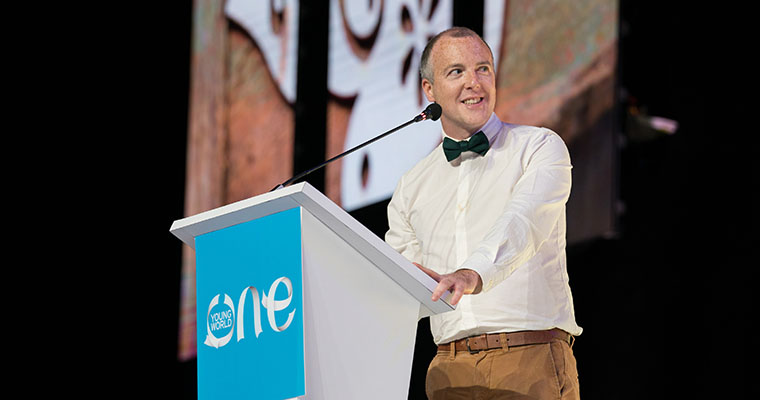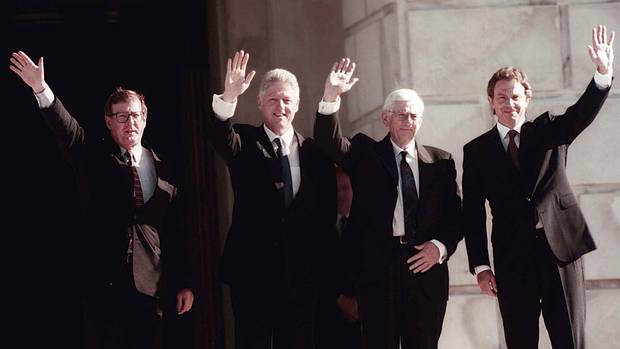Coming home
My family had only lived back in Northern Ireland for a year when the Good Friday Agreement was signed. Our parents told us we would be moving ‘home’ the night that President Bill Clinton came to Belfast in 1995 – we watched on TV from our home in Surrey, England as the President of the United States planted seeds of hope within the people of Belfast and Derry-Londonderry.
We were in Donegal on holiday Easter week of April 1998. I remember vividly as a teenager the sense of history and hope for the future that the signing of the Agreement symbolised.
It was as if anything was possible.
We lived at a time when politics was about relationship building –the seemingly intractable could be overcome with passionate people, working together to achieve the impossible.
I’ve been an advocate for the Agreement for the past 20 years: For the values it espouses, for the opportunity it has created and the possibility of our relationships. It was a visionary document that allowed the space for centuries-old conflict to be brought to an end.
I recall in 2001, proudly campaigning for Lady Sylvia Hermon in the Westminster election in North Down – an Irish man shoulder-to-shoulder with a unionist politician! This election was the ‘pro-agreement’ candidates versus the ‘anti-agreement’ candidates. For me it was simple: it was the first election I ever voted in and I was determined to ‘cross the political divide’ to ensure the Agreement survived. In fact, my 18th birthday was the week before the election and I received a copy from the late Sir Jack Hermon of his autobiography: ‘Holding the Line’. I also received a book from the wonderful Ciaran McKeown about his role in founding the Peace People.
Perhaps reminding me on my first day of adulthood of the complex and diverse perspectives on the place I called home.
The Agreement created new organisations, bodies, institutions and arrangements - the mechanics to realise the possibility of new relationships: between the communities in Northern Ireland, the people North & South and the people’s between these islands. Simply put, the Agreement was about building interlocked and interdependent relationships between people.
Whilst it is of course entirely regrettable that one of the key institutions of our Agreement, the Executive & Assembly are not functioning, it does not deflect from the enduring importance of the Agreement.
Our society is transformed.
I’ve had the privilege of watching the place I call home become a place of possibility and prosperity. I received a world-class education at Queen’s University Belfast and a rewarding and successful career as a solicitor.
I was part of a generation enjoying the possibility promised by the Agreement as we sought to build a normal society and be a generation proud to call here home.
Through my work as a lawyer and my engagement in civic society, I came to realise that not all have enjoyed the fruits of the Agreement. Many victims have been forgotten. Mental health issues are inadequately addressed and paramilitarism remains a scourge in communities. Our children are educated by virtue of their religion and our communities continue to live under the shadow of ‘peace walls’.
I came understand why, to some, the Agreement was not a panacea.
We created new institutions and cranes shaped the skyline of Belfast, but these were not changing attitudes.
Put simply: we have not become a truly reconciled people.
The problem is two-fold: firstly, too many saw the Agreement as a final step, rather than the beginning of a new journey. And secondly, we have not fully imagine the possibility of the Agreement.
Hope for Home
Last year, I was invited to address the One Young World summit in Bogota, Colombia. I was on stage with two Nobel Peace Prize winners: Kofi Annan and President Santos of Colombia together with exceptional young people from Afghanistan, Kurdistan, Guinea, Israel, Thailand, Kurdistan and Rwanda. There were 2000 young people representing 198 countries around the world present. In that moment, I realised the awesome possibility of my home. My message was simple: to build peace, you need courage, passion and a dedication to building relationships, especially with those with whom you passionately disagree. My manta: ‘it’s all about relationships’.
President Santos praised the people of Northern Ireland for giving him the courage to push for peace in Colombia. Delegates from around the world saw our home as a beacon of hope.
This week in Belfast, over 200 international delegates from around the globe will come to Belfast for ‘Peace and Beyond’. This is an international conference focused on peace-building to mark the 20th anniversary of the Agreement led by the British Council in partnership with Queen’s University Belfast & Ulster University in association with CDPB. This international focus reflects the ripple of the Agreement and encourages us to realise that we can be global leaders in how to build the bridge between peace and reconciliation.
It will also be the week in which the world will reflect on the leaders whose vision and courage brought about the Agreement. My alma mater will host President Clinton, Senator George Mitchell, Jonathan Powell, Bertie Ahern, Lord Trimble, Monica McWilliams, Gerry Adams, Lord Alderdice, Seamus Mallon and many others. This generation understood the importance of compromise and the courage required in relationship building.
A massive day for @QUBelfast one year in the planning. Join the conversation on facebook and twitter using the hashtag #GFA20 pic.twitter.com/CdQovcR83s
— Ryan Feeney (@ryanjfeeney) April 10, 2018
Our great hope must be that our current generation of politicians can summon the same vision and courage.
For me, this week will also be about our unsung heroes: the every-day peace builders.
There are many within our society who have been building bridges for their entire lives: often at great cost to themselves and their families.
I think of the extraordinary role of religious ministers; our journalists; our business people; our educators; our trade unionists; our community workers; our student movement; our women’s organisations; our youth organisations; our LGBTQ+ organisations; our ethnic minority organisations; campaigners for those with disabilities; our musicians, artists & entertainers; our community & voluntary sector; our entrepreneurs; our police service & emergency service providers; our healthcare professionals; our public servants, our politicians, our civic leaders and all those who have lived out the values of the Agreement.
I think of our victims – that we will find a way to bind up the wounds of the nation to build a peaceful future as a legacy to all who died.
I think of think of the incredible generation growing up in our home: the social entrepreneurs, young professionals, digital experts and ambitious business people. They are building our prosperity process – they understand their responsibility to give opportunity to all.
I think of our selfless philanthropists who have dedicated their passion, energy, time and money to build peace. I’m fortunate to be involved with The Ireland Funds who epitomise this dedication. 40 years: 3000 organisations committed to peace, reconciliation, sports, the arts and education supported by this innovative and dynamic organisation. Understanding that philanthropy equals progress.
It’s why this Thursday, as part of ‘Peace and Beyond’, every day peace builders will be celebrated across 7 venues with 30 organisations and 60 speakers. We will showcase just a snapshot of the thousands of inspiring, innovative and incredible people and organisations who day-in-day-out dedicate themselves to building peace and finding solutions to the complex issues we face.
These people and the thousands like them, represent my great hope for the place I am proud to call home. They represent the vision, courage, resilience and leadership that will continue our journey towards reconciliation.
Home of Hope
In 2021, just 3 years from now, this island will begin a ‘second century’. For the Republic of Ireland: it will mark the second century of independence. For Northern Ireland: it will mark the second century of partition / the creation of the state of Northern Ireland.
I ask this question: by the end of the second century, what will we have achieved?
For me, the answer lies in the Agreement. New beginning; Fresh Start; Tolerance; Mutual Trust; Human Rights for All; Partnership; Equality; Mutual Respect; Exclusively Democratic & Peaceful Means; Good Faith; Reconciliation.
Let us take these ideals and realise them in a meaningful and inclusive way.
I believe the best way to answer this question is to ask the next generation. My two-year-old nephew Ollie will probably live to see the 22nd Century.

Therefore, we must have the courage, not to be bound by our own fixation of what the future might be. Rather to dare to ask: what kind of society do we want for our children.
We as a people have a unique opportunity in human history: to build upon our hard-earned peace, to reconcile and to re-imagine the potential of our relationships to build a home of hope.
Written by Conor Houston. Director at Houston Solutions Ltd| Consultant at the Centre for Democracy & Peace Building | Head of Engagement at Digital DNA | Governor at Irish Times Trust | Chair at Ireland Funds Young Leaders Belfast | One Young World Ambassador | Lawyer | Strategist



